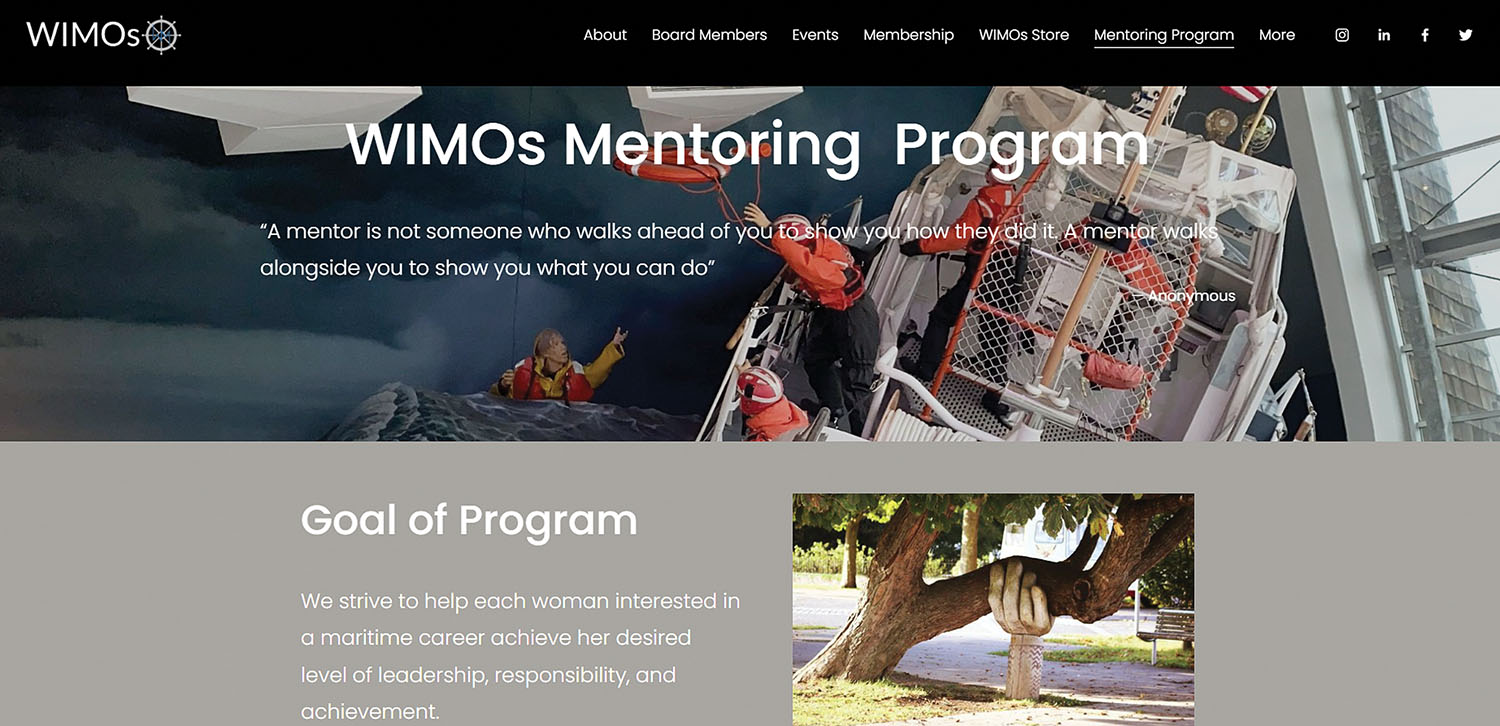Women in Maritime Operations (WIMOs) is building on its mission of educating, engaging and elevating women through its new mentorship program.
Twenty-six mentors have volunteered their time to assist women who are considering a maritime career or those in the industry who want to expand upon it.
WIMOs began taking applications for protégés March 13 at https://www.wimos.org/mentoring.
Angelica Brooks, a WIMOs communications intern who is also a Coast Guard veteran, active reservist and full-time grad student at Columbia University, said some of the organization’s leaders started talking about offering a mentoring program last fall.
Mentors are registered WIMOs members who work in the maritime industry, but protégés are not necessarily WIMOs members. Some of those who have already expressed interest in the program are active-duty military members, veterans, college students and those starting out in the industry, Brooks said.
“The goal is to encourage more women to enter the maritime field, which has traditionally been a predominantly male-oriented field,” said Capt. Emily Lai, deputy chief surveyor – Gulf Ports for National Cargo Bureau, who has been instrumental in helping to begin the program.
Once the mentors and protégés are matched by the WIMOs mentoring team, they will meet in person or by videoconferencing software at least once a month, or more often if proteges are in more need.
Mentors will provide guidance and feedback and “just be empathetic and listen to a lot of the concerns a new person, in particular, might be feeling,” Lai said.
She noted that some of the challenges newcomers in the maritime industry may have may be unique to women, and that they could benefit from knowing and being encouraged by other women who have already built their careers in the field.
Mentors need to commit at least three months to the program, and WIMOs plans on doing regular check-ins using an online feedback form to ensure that the mentoring relationships are successful ones, Brooks said.
To promote the program, national board members have reached out to regional members as well as Coast Guard units and universities. In February, some WIMOs mambers also met with female students majoring in maritime who are part of the Sisterhood Of University Leaders (SOUL) at Texas A&M University’s Galveston campus. Brooks also plans to attend a career fair for high school and college students in the New York City area that drew about 500 students last year.
WIMOs leaders are excited about the program’s prospects, based on the interest it has already drawn.
Brooks believes it will be of interest to both the blue-water and brown-water mariner communities as about 35 percent of the mentors who have signed up so far have experience working in the inland navigation sector. They come from roles such as barge logistics, cargo surveying, supply management and maritime administrative and regulatory roles, Lai said.
Protégé applicants have been just as diverse.
Lai gave an example of one applicant, a college student who is a recreational yacht and sailboat enthusiast and wants a career on or near the water.
Brooks recalled one woman who signed up to be both a mentor and a protégé. She served 20 years in the Coast Guard and is seeking to retire this year, but she wants to stay in the maritime industry and is seeking to increase her network, she said.
Brooks said women have relied on other women for years to succeed in the industry. She pointed to her own experience on the U.S. Coast Guard vessel the Barque Eagle, where out of a crew of about 70 people, she was one of the only women of color on board and one of two female officers on the ship.
“A lot of the women who sailed as trainees, they still reach out to me and try to connect one way or another, either by social media or phone,” she said.
She sees the mentorship program as a way to help women foster a sense of belonging within the maritime industry.
“It doesn’t matter where you work,” she said. “It really does make a difference when you can look around and feel like you belong. One way to initially do that is by seeing people that you can relate to and identify with.”
Lai said she would have benefitted from a program like the WIMOs mentoring program early in her career. Back when she graduated from the U.S. Naval Academy in 1989, women made up less than 7 percent of those attending military academies, she said.
Lai eventually transitioned into a commercial sailing career.
“Over time I have seen the percentage of women interested in the maritime industry increase, so there is a momentum going, but obviously it’s not representative of the population at large,” she said.
Lai said she remembers thinking early in her career, “If I only had somebody I could lean on, somebody I could just talk to, email, how much of a difference that would be.”
“Those situations where I had to struggle might have been a little bit easier with a mentorship,” she said.
She also sees the WIMOs mentorship program as a way of giving back to the industry that has served her well.
She said, “It’s a wonderful way to pay it forward to the next generation of women who are entering this field.”
Caption for photo: Social media post used to promote WIMOS mentoring program.




